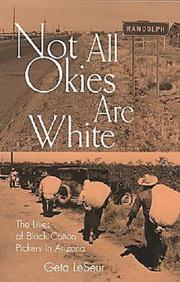| Listing 1 - 4 of 4 |
Sort by
|
Book
ISBN: 0300022174 Year: 1980 Publisher: New Haven (Conn.) Yale university press
Abstract | Keywords | Export | Availability | Bookmark
 Loading...
Loading...Choose an application
- Reference Manager
- EndNote
- RefWorks (Direct export to RefWorks)
African American agricultural laborers --- Cotton growing --- Plantations --- History --- History --- History --- Southern States --- History
Book
Year: 2012 Publisher: Cambridge, MA : National Bureau of Economic Research,
Abstract | Keywords | Export | Availability | Bookmark
 Loading...
Loading...Choose an application
- Reference Manager
- EndNote
- RefWorks (Direct export to RefWorks)
In the American South, post-bellum economic stagnation has been partially attributed to white landowners' access to low-wage black labor; indeed, Southern economic convergence from 1940 to 1970 was associated with substantial black out-migration. This paper examines the impact of the Great Mississippi Flood of 1927 on agricultural development. Flooded counties experienced an immediate and persistent out-migration of black population. Over time, landowners in flooded counties dramatically mechanized and modernized agricultural production relative to landowners in nearby similar non-flooded counties. Landowners resisted black out-migration, however, benefiting from the status quo system of labor-intensive agricultural production.
African American agricultural laborers --- African Americans --- Agricultural innovations --- Floods --- History. --- History

ISBN: 0826212719 082626221X 9780826262219 9780826212719 Year: 2000 Publisher: Columbia, Mo. : University of Missouri Press,
Abstract | Keywords | Export | Availability | Bookmark
 Loading...
Loading...Choose an application
- Reference Manager
- EndNote
- RefWorks (Direct export to RefWorks)
"Vividly revealing the challenges faced by a group of migrant workers who eventually farmed the multiracial town of Randolph, Arizona, Not All Okies Are White is a celebration of the resilience and adaptability of people too often ignored by history texts." "Not All Okies Are White recaptures the ways of life for black migrant workers, as well as Hispanics and Native Americans, in the first half of the century through richly detailed interviews of the families of Randolph's founders. Through the words of each narrator, these personal stories recount work experiences and survival strategies offering new insights into the people's relationship to the land. The narratives reveal a creative tension between place and identity, movement and migration. LeSeur provides a historical, cultural, and literary context for the oral histories by incorporating news articles, information culled from historical society archives, analyses of films and novels, advertisements, and photographs." "Not All Okies Are White will appeal to scholars and general readers interested in oral history, African American history, multicultural studies, and women's studies."--Jacket.
Cotton farmers --- African American agricultural laborers --- Afro-American agricultural laborers --- Agricultural laborers, African American --- Negro agricultural laborers --- Cotton growers --- Farmers, Cotton --- Growers, Cotton --- Agricultural laborers --- Farmers --- E-books
Book
ISBN: 0801461154 0801460670 9780801460678 080144778X 9780801447785 9780801447785 9780801461156 Year: 2011 Publisher: Ithaca, NY
Abstract | Keywords | Export | Availability | Bookmark
 Loading...
Loading...Choose an application
- Reference Manager
- EndNote
- RefWorks (Direct export to RefWorks)
In Hirelings, Jennifer Dorsey recreates the social and economic milieu of Maryland's Eastern Shore at a time when black slavery and black freedom existed side by side. She follows a generation of manumitted African Americans and their freeborn children and grandchildren through the process of inventing new identities, associations, and communities in the early nineteenth century. Free Africans and their descendants had lived in Maryland since the seventeenth century, but before the American Revolution they were always few in number and lacking in economic resources or political leverage. By contrast, manumitted and freeborn African Americans in the early republic refashioned the Eastern Shore's economy and society, earning their livings as wage laborers while establishing thriving African American communities.As free workers in a slave society, these African Americans contested the legitimacy of the slave system even while they remained dependent laborers. They limited white planters' authority over their time and labor by reuniting their families in autonomous households, settling into free black neighborhoods, negotiating labor contracts that suited the needs of their households, and worshipping in the African Methodist Episcopal Church. Some moved to the cities, but many others migrated between employers as a strategy for meeting their needs and thwarting employers' control. They demonstrated that independent and free African American communities could thrive on their own terms. In all of these actions the free black workers of the Eastern Shore played a pivotal role in ongoing debates about the merits of a free labor system.
Wage payment systems --- Slaves --- African American agricultural laborers --- Agricultural laborers --- Free African Americans --- Enslaved persons --- Persons --- Slavery --- Afro-American agricultural laborers --- Agricultural laborers, African American --- Negro agricultural laborers --- Pay structure --- Wages --- Agricultural workers --- Farm labor --- Farm laborers --- Farm workers --- Farmhands --- Farmworkers --- Employees --- Free Afro-Americans --- Free blacks --- African Americans --- History. --- Emancipation --- Economic aspects --- History --- Employment --- Free Black people
| Listing 1 - 4 of 4 |
Sort by
|

 Search
Search Feedback
Feedback About UniCat
About UniCat  Help
Help News
News